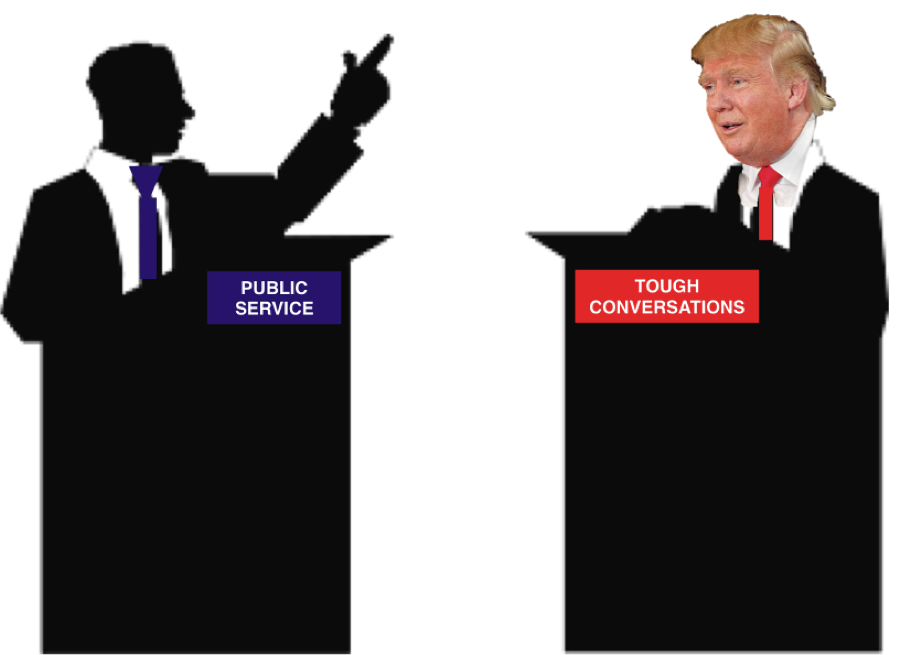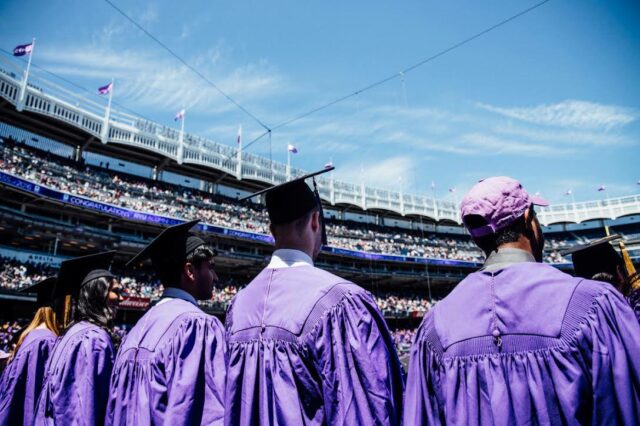
Raniah El-Gendi, Contributing Editor
Let’s begin with an important clarification: This piece will NOT be about Donald Trump (who, in accordance with J.K. Rowling’s views, will from here on mostly be referred to as “He-Who-Must-Not-Be-Namedâ€). But through all his hateful statements, Donald (HWMNBN) has an ironically uncanny ability to evoke issues central to the meaning of life—and public service. In the past week alone, people who are literally all over the world have been forced to engage in dialogue about what it means to belong, our relationship with the communities in our society, and the danger of undermining the importance of pluralism. So bravo, Donald, really.
Perhaps surprisingly, many people do not share my sentiment that HWMNBN provides an affordable comedy hour and should be appreciated only as such. In truth, Old Donald’s public support is indeed troubling. His approval ratings and public supporters seem to have created a sense of legitimacy for even more people (mainly lost and confused Republicans) to air views they could not comfortably publicize before: perspectives that are anti-Islamic, anti-immigrant, ethnocentric, and more.
Yet I couldn’t be more thrilled to see these people come out and publicly defend Donald’s views. Bizarre, right? But there’s a simple reason: One of my biggest pet peeves is this idea that people should not engage in dialogue with one another on sensitive or controversial topics. Too many of our conversations are not based on honesty and an earnest desire to know and better understand one another because of this unwillingness to be open and share our honest opinions, no matter how ugly they may seem.
In some ways, old Donald has achieved what we, as public policy students here at NYU Wagner, have been unable to do on a comparable scale: Start tough conversations. Within this year’s context of brutal police aggression against blacks, the Black Lives Matter movement, and, of course, the call to build agendas around diversity and inclusivity at institutions of higher education across the U.S. including right here at NYU, I have sadly continued to witness a lack of individuals willing to engage these subjects in a meaningful way where different views—perhaps controversial or not mainstream—are declared. Airing and discussing these views can give them a chance to evolve and contribute to a more nuanced, comprehensive understanding of our perspectives, and hence, of one another.
As a school of public service, NYU Wagner’s mission includes providing students “with the skills they need to confront society’s most pressing problems [and] face the constantly changing challenges of public service.†Yet as a masters student at this elite institution, I am still yearning for space to confront these issues with people who disagree with me, who challenge my views and force me to take on new perspectives—not only those who acquiesce to my opinions, especially when they don’t actually agree. To prepare public servants to confront society’s core challenges, Wagner still has a ways to go toward creating an environment where constructive, respectful dialogue can occur among groups who may fundamentally disagree with one another, or may not. Simply taking a politically correct stance or supporting mainstream views on topics such as racism, anti-Muslim hate, and attitudes towards immigrants, among others, doesn’t serve anyone well, and is antithetical to what public service is actually aimed at; engaging with those people from backgrounds very different than our own in a meaningful and productive way. If we are unwilling to engage with each other in this way, we should seriously reflect on what has led us to pursue careers in public service and the implications of those reflections. As public policy students, in some ways we are put to shame that it took malice and perversion of truth from Donald to make us have some of the conversations we are only just really starting to engage in now.
Of course, obviously, no one should support, or is here supporting, HWMNBN’s bigoted and discriminatory views towards any group. He is wrong. From our most basic level of shared humanity, we should not tolerate his views—nor should we allow such rhetoric to breed a culture of doubt, fear, and suspicion among us. Some people will always choose to demonize vulnerable groups to distract from the very real dangers of society’s larger, underlying institutional injustices. Such demonization and scapegoating can and will unfortunately lead to the endangerment of these groups. But there is also always hope, another perspective to consider, and room for thoughtful dialogue that expands viewpoints and creates a more comprehensive understanding amongst people. Conversation that can result in an ever stronger community.Â
I could not be more grateful for my experiences here; I have met such wonderful people from rich and diverse backgrounds to which I may otherwise never have been introduced. And I’m grateful for having been given the opportunity for us to take on this collective challenge together. If there is an opportunity to react to hate and fear with love, understanding, dialogue, and shared compassion, there is no better season for it than this one.
Raniah El-Gendi is a second year public and non-profit management student in NYU Wagner’s School of Public Service MPA program with an international specialization. Currently she is an NYU Social Sector Leadership and Diversity Fellow and a Research and Public Policy Fellow at the Women’s City Club of New York.



